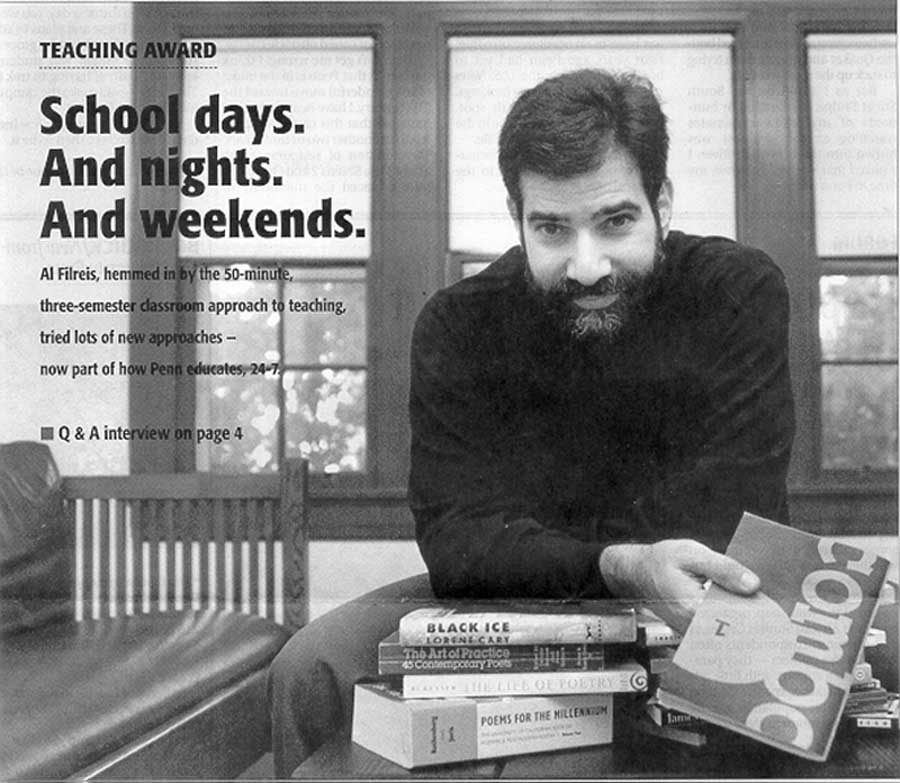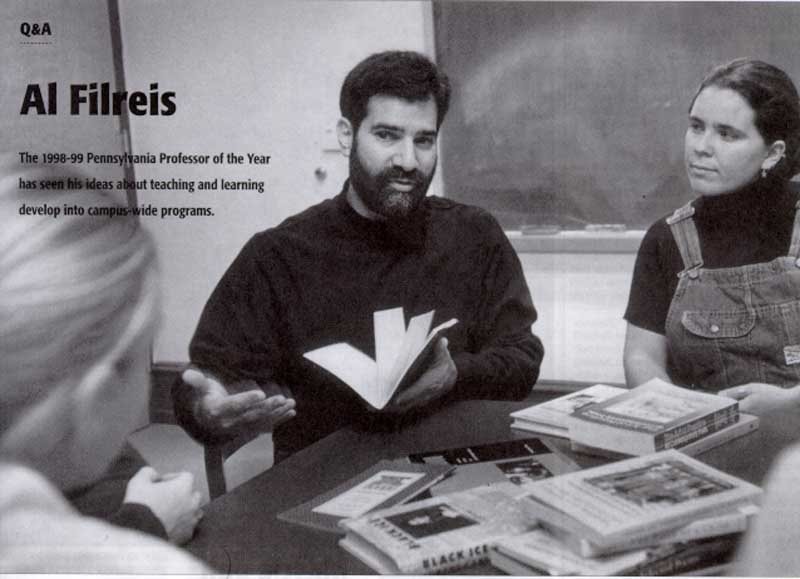School days. And nights. And weekends.
Pennsylvania Current
December 3, 1998
-
School days. And nights. And weekends.
Pennsylvania Current
"When you create a space in which learning communities can thrive...they're worth the price of admission. They're worth tuition." Professor of English barely describes the work of Al Filreis. He has committed himself to creating learning innovations across the campus and across the curriculum, including the phenomenal Kelly Writers House, of which he is director, where professional writers, students, and would-be writers of all backgrounds from campus and beyond share their passion for words; the Wheel project of around-the-clock academic support - including computer support, match and writing support and library research help - in the residences; Alumverse, a listserv poetry -writing course for alumni, designed to last five months, but still going strong after two and a half years; and a listserv college course for 32 pre-matriculated students.*
Named Pennsylvania Professor of the Year for 1998-99 by the Carnegie Foundation for the Advancement of Teaching and the Council for Advancement and Support of Education, Filreis has been a member of the faculty since 1985. Since then, his teaching style has evolved with his thinking about how students learn, and he has directed his teaching energies beyond the classroom, beyond only matriculated students, beyond the campus, right on into cyberspace. All the projects to which Filreis has devoted himself have a common thread: they involve out-of classroom learning experiences.
Q. What's important to you about teaching?
A. We have, the profession of teachers, a course fetish. We think that everything that you can do with conveying an academic discipline can be done in a course. Students in the sciences can get a lab experience as the culmination of three or four years' immersion in the sciences. What's the equivalent of that in the humanities? I'm never happier at a university than when I am teaching, but I have wanted to find a way to break out of the limit of the course.
Q. Why did that seem important to you?
A. Most of the good work that happens as a result of a good course happens about a year later or six months later. And where are we at that point? We're off in different directions. I'll give you an example. Dave Slarsky [C'98] was a student in my poetry survey course, English 88. Sometimes he was in the back of the room reading the Daily Pennsylvanian with his baseball hat turned backwards, and sometimes he was right there up front. Last year, two years after that course, he was a mainstay at the Writers House. Now I taught [the poet Ken] Koch in my class, and didn't know that Dave had remembered it, but he had. Not only did he remember it, but he liked Koch, and he wanted to do what might be called an informal senior thesis or colloquium or senior project, a culmination of his work on poetry, by inviting Koch, by writing the introduction, by reading, by leading some discussions at the Writers House. Everyone shows up ... and it's this surprising, magical learning experience. And I was proud, but all the learning had taken place on a time delay.
Q. How did the Wheel project get started?
A. The point that I noticed was that the students began to study and work just when all the academic support systems had shut down. That's a major disconnection and no university can overcome it by asking the faculty to start work at nine [p.m.]. But the other so-called nine-to-five is the students' life. So we took students trained by departments in academic disciplines and distributed them across the houses to provide front-line, all-night, all-day help. But part of that is that the academic departments involved in the Wheel project took responsibility for it. The math department is probably the best example. They thought: Calculus is a major piece of the undergraduate experience; the students do their calculus work when we're not there; we need someone there for us. The future of residential learning depends on a good relationship between the faculties and these open-all-the-time spaces where the students do their work.
Q. What is your thinking about learning communities?
A. Taking full advantage of gatherings - spontaneous and organized - of students with faculty and staff to create extra-class learning is the exciting feature of a residential campus. When Slarsky gets contemporary poetry through hosting an event, he's not only theoretically understanding this particular kind of postmodern poetry. He's also getting a poet on a train to a place, and he's providing for dinner and he's putting an audience there, and he's making the connections for them, and ... he can stand back and watch a momentary, fleeting, but still significant learning community form around an idea he had that comes almost secondarily from something I gave him. And so he'll never forget that. Whereas the lesson on Kenneth Koch, which was a fine lesson back in English 88, is forgettable. So I think with learning communities, you can only hope for the best when you create a space in which they can thrive, but when they happen, they're worth the price of admission. They're worth tuition.
Q. Has this affected the way that you teach in the classroom?
A. Yes, very much so. I don't lecture any more. I find myself seeking as many ways as I can to present the material.
Q. For example?
A. The class time, the meeting time is so precious for creating the interaction that gets sustained outside the class. The most obvious example is the ubiquitous use of electronic mail to follow up with students. So I never feel at the end of 50 minutes that I have to conclude. I used to have a 49th-minute concluding statement that used to shut everybody up and made them want to say "oooh." But now, I say we'll pick this up in our electronic conversation, and we'll see where we are at the beginning of the next class. And if that's a Thursday at 2:50 p.m., by the time Tuesday at 2 comes around, we will have moved some mountains.
Q. By having class discussions that flow beyond the classroom time, what happens to your time management?
A.It gets better. All the faculty who are engaged teachers have always spent tremendous amounts of time preparing for class. I don't prepare for class now. My preparation is to participate in the discussion between classes, and then take that and bring it back into the classroom. Of course I have to read the material, but I always had to read the material. The hardest thing you can do if you're not engaged between Thursday and Tuesday is to restart the engine on Tuesday morning. Then you're frantic, in that old mode. You could spend the whole morning on Tuesday preparing for your 2 o'clock class. I think it's misleading to say that this is new time, extra time. I bristle at the time management question a little bit.
Q. Is there something in your background that led you beyond the classroom?
A. When I was reading William Carlos Williams in college as a senior project, I was treating it as just a project, an academic task. My father, who was infinitely curious though not a particularly educated person, found out about my reading Williams, didn't just buy all the books for himself so that he could participate, but drove into New York to the headquarters of New Directions Press, which puts out Williams, went to James Laughlin, the famous, eminent editor-in-chief, an told him his son was reading Williams and he wanted all the books of Williams. In a way that's just a story about a naive dad who loves his son, but it's also a story about over-the-top curiosity, but unnecessary energy spent to convey at least symbolically to me total engagement. Suddenly, I was a better student at my university and I Wrote better about Williams because there was this man in New Jersey who had gone off the deep end to support the idea.
-
Al Filreis
Pennsylvania Current


